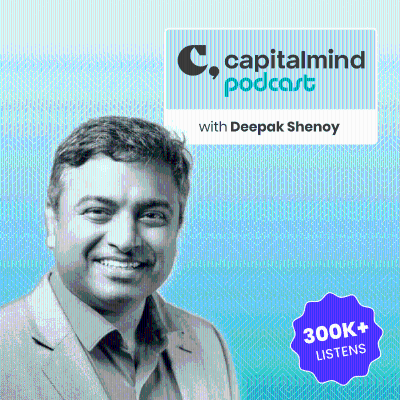
Capitalmind Podcast
Englisch
Gratis en Podimo
Kostenlos hören bei Podimo
Starte jetzt und verbinde dich mit deinen Lieblingspodcaster*innen
- Vertraut von über 1 Mio. deutschen Hörer*innen
- Über 1.000 lokale Podcasts und Shows – nur bei Podimo
- Keine Zahlung nötig
Mehr Capitalmind Podcast
Capitalmind looks at stocks, bonds, funds and the macro to bring you their view on the Indian financial markets. We discuss all things related to investing at our focussed podcast that keeps it simple. For more, go to capitalmind.in and to invest with us, visit capitalmindwealth.com
Alle Folgen
99 FolgenWill the U.S. Market Crash in 2026?
For 17 years, Deepak Shenoy has made annual Diwali predictions about markets, crashes, interest rates, and more. But how many were actually right? Shray sits down with Deepak Shenoy from Capitalmind to examine his prediction history from 2007 to 2024. He correctly called the 2008 crash and Trump's 2024 victory. But real estate and gold? Wrong almost every year. We break down why most predictions fail and what makes the rare successful ones different. Deepak explains the three elements of valid predictions (direction, magnitude, timeframe), why cash on sidelines signals crashes, how AI bubbles mirror 2000, and why interest rates are easy to predict but impossible to profit from. This episode breaks down crashes, bubbles, and market timing, offering honest takes that you can actually use. Don't forget to like, share, and subscribe for more real insights on building wealth in Indian markets! Follow Capitalmind on Social Media: 📝 Linkedin: https://www.linkedin.com/company/capitalmindwealth-pms/ [https://www.linkedin.com/company/capitalmindwealth-pms/] Instagram: https://www.instagram.com/capitalmindhq?igsh=ZG9zYmVtbnBwemZr [https://www.instagram.com/capitalmindhq?igsh=ZG9zYmVtbnBwemZr] Twitter: https://x.com/capitalmind_in?s=21 [https://x.com/capitalmind_in?s=21] Chapters: 00:00 Introduction & 2024 Predictions Recap 01:00 Will There Be a Market Crash in 2025? 03:40 How AI Could Trigger the Next Crash 06:15 Why This Time Is Different from 2008 09:40 US Recession + Inflation = Stagflation? 12:10 Why Indian Markets May Keep Rising 15:00 The Real Estate Prediction Trap 20:20 Gold, Inflation & Interest Rate Outlook 28:20 Japan's 30-Year Debt Problem Explained 33:40 Can the Rupee Go Global? 40:20 Why Predictions Usually Fail 46:00 Don't Predict, Respond Instead 50:10 Deepak's 2025 Predictions Recap 58:00 Closing Thoughts
Gold, Silver, Equities: Which One Deserves a Place in Your Portfolio?
When Indian Equity Markets Go Sideways: Are Alternative Assets Worth It? Indian equities have been flat for over a year. So where should you actually put your money? Shray sits down with Deepak Shenoy from Capital Mind to break it all down. Silver just hit $50 for the first time in 45 years. Deepak explains the Hunt Brothers saga, the Thailand import drama, and why silver might only deserve 2% of your portfolio. Gold – it's outperformed. But should you buy now? Only 30% of the time has gold beaten Nifty over 10 years. We also discuss foreign stocks, why debt funds aren't just parking lots, and whether India at 21-22x earnings is still expensive. If you're confused about where to deploy capital right now, this episode is for you. Don't forget to like, share, and subscribe for more insights on building real wealth in Indian markets! #investing #stockmarket #alternativeassets #gold #bitcoin #portfoliomanagement Follow Capitalmind on Social Media: Linkedin: https://www.linkedin.com/company/capitalmindwealth-pms/posts/?feedView=all [https://www.linkedin.com/company/capitalmindwealth-pms/posts/?feedView=all] Instagram: https://www.instagram.com/capitalmindhq?igsh=ZG9zYmVtbnBwemZr [https://www.instagram.com/capitalmindhq?igsh=ZG9zYmVtbnBwemZr] Twitter: https://x.com/capitalmind_in?s=21 [https://x.com/capitalmind_in?s=21] Chapters: 0:00 - Intro 2:11 - Silver: What's Happening Right Now? 7:19 - Hunt Brothers: The Biggest Silver Bet Ever 11:58 - Should You Own Silver? 15:49 - Why Diamonds Are a Terrible Investment 17:38 - Gold: Why Deepak Was Wrong 21:14 - Gold as an Inflation Hedge 23:03 - When Gold Could Crash 40% 27:05 - Why We Treat Gold Differently Than Stocks 30:00 - Land Deals: How to Make 400% Returns 32:20 - Why Luxury Watches Beat Stocks 34:45 - Bitcoin: The Leverage Problem 41:32 - Bitcoin's Altcoin Curse 44:08 - Quantum Computing Could Kill Bitcoin 47:32 - How Much Bitcoin Should You Own? 50:22 - When Big Winners Become Too Big 52:01 - Foreign Stocks: The Smart Diversification 56:46 - Debt Funds: Beyond Just Parking Money 1:01:47 - Debt Market: Hidden Inefficiencies 1:04:06 - Why Debt Funds Deserve Your Money 1:06:07 - Why Bank FDs Are Ripping You Off 1:08:27 - Is India Still Too Expensive to Invest? 1:11:06 - Why 20x PE Actually Makes Sense 1:13:54 - Final Thoughts
From H1B to Dream11 - When risks hit you hard
What do DreamFolks, Dream11, JSW Steel, and Donald Trump's H-1B visa policy all have in common? Each shows how unexpected risks can reshape markets and investments overnight. Deepak Shenoy and Shray Chandra break down 5 types of risk you never saw coming from business model collapse and legal shocks to regulation, policy changes, and passive investing illusions. Chapters: 00:00 - Intro 01:53 - DreamFolks 16:19 - JSW Steel and Bhushan Steel & Power 30:41 - Dream11 & Crypto currency 41:56 - H1B Visa situation 52:10 - When money moves markets
ESOPs Demystified: Taxes, Dilution & the Path to Wealth in India!
ESOPs (Employee Stock Options) are one of the least understood parts of compensation in India. Are they wealth creators or just glorified lottery tickets? We break down everything you need to know, the trade-off between salary and ESOPs, the risks of taxation and dilution, and how exits, IPOs, and secondary markets really work. From early employee bets to Flipkart's game-changing Walmart deal, we explore stories that show both the pitfalls and life-changing rewards. If you've ever been offered ESOPs or are considering them. This podcast will help you make informed decisions about your financial future. Chapters: 00:00 - Intro 02:57 - Salary vs ESOP: the real trade-off 15:02 - ESOPs ≠ Shares? 28:35 - Should companies help you exit? 37:41 - Black-Scholes for expense 40:39 - Why not just give shares? 45:59 - Promoters/Directors rules in India 50:11 - What every employee must check in their ESOP package! 57:20 - After the payout: diversify & spend
Wealth as a Tool, Joy as the Goal
What if money wasn't the goal… but the tool? Deepak Shenoy and Shray Chandra dive deep into how money can enable experiences, freedom, and meaning, instead of becoming an end in itself. 00:00 Intro 02:33 GDP, Good Life, and Getting Real About Returns 15:14 The Real Cost of Wealth (and the Price of a Good Life) 31:20 Planning for Joy, Not Just Returns 43:34 Compartmentalize to Live Fully 01:04:04 I have enough money, what do I do now? 01:13:23 Is winning in life all about money?















































